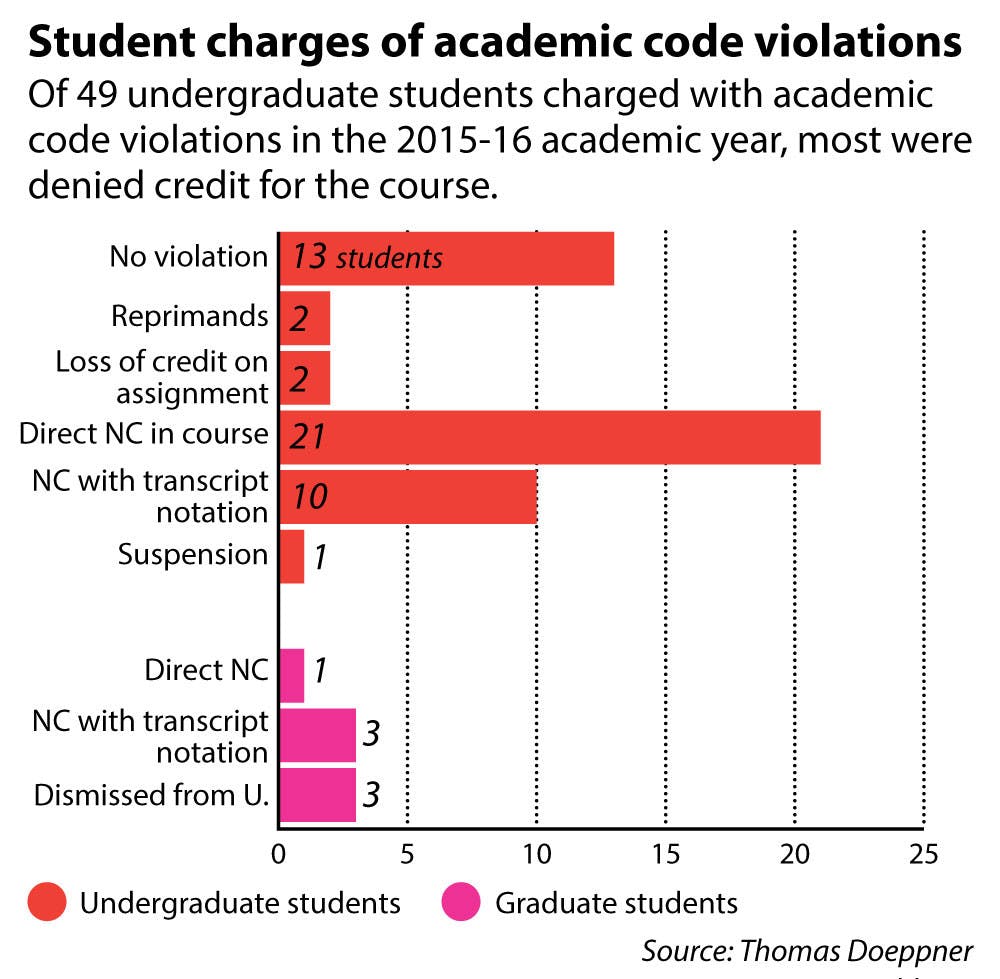Although measures have been taken to reduce academic code violations, the numbers remain high, with over 50 percent of violations occurring in the computer science department, said Thomas Doeppner, associate professor of computer science and co-chair of the standing committee on the Academic Code that recently released a report on academic code violations.
From the most recent data available, 49 undergraduate students were charged with academic code violations during the 2015-16 academic year, Doeppner said. While 13 students ultimately received no violation, two received reprimands, two received loss of credit in the exercise, 21 received a direct No Credit in the course, 10 received a No Credit with transcript notation and one was suspended, he added. There are eight total possible sanctions, all listed in the University’s Academic Code.
Of the seven graduate students charged with violations, one received a direct No Credit, three received a direct No Credit with transcript notation and three were dismissed from the University, Doeppner said.
The standing committee on the Academic Code is requesting to increase the number of faculty committee members from five to nine due to the large number of cases being heard, Doeppner wrote in a follow-up email to The Herald.
The main effort to reduce academic code violations involves “an online tutorial which guides students through the academic code,” said Deputy Dean of the College Christopher Dennis. All students are required to take this tutorial prior to matriculating to Brown, he added.
In addition, faculty members are encouraged to include their standards for academic integrity in the class syllabi, Dennis said.
In the computer science department, explaining these standards sometimes includes online skits or quizzes, Doeppner said. Students must sign the collaboration policy, which they are immediately tested on and reminded of periodically throughout the semester, he added.
Although the majority of academic code violations occur in the computer science department, this may be partially attributed to the fact that “the tool for accessing collaboration is more robust,” said Dean of the College Maud Mandel.
The department utilizes Measure Of Software Similarity, or MOSS, a system that detects plagiarism in programming. After MOSS identifies a suspicious case, the professor investigates further, Doeppner said.
“In many cases, it’s not that students directly copied each other but that they worked together on something,” which is against course policy, Doeppner said.
Another common form of violation is known as furnishing, which is when one student receives answers from another — often someone who previously took the class, Mandel said. In such a case, both students are punished.
There is also a slight overrepresentation of international students compared to domestic students in total academic code violations, as well as first-years compared to other years, Dennis said.
“Most of this has to do with students coming from places with very different schooling systems and rules,” Mandel said. For example, writing conventions may vary widely between cultures, and expectations in college differ from those in high school, she added.
In response to these trends, the University revised the international student orientation two years ago to include presentations on academic code and integrity expectations in the United States and at the University, Dennis said.
“Part of the education we provide as a university is helping students learn what the rules are and how to follow them,” Mandel said. In an effort to help students succeed, Mandel has been talking to the Undergraduate Council of Students about having an academic integrity panel or even an academic integrity week, she added.
Another idea that has been considered is whether or not the University would benefit from an honor code, Dennis said. In such a system, the panel that reviews academic code violations would be comprised not of faculty and administrators, as it currently is, but of students.
“(Academic integrity) really is a community standard,” Dennis said. “Students are responsible for their own work, and if a student cheats, it diminishes the work of every … student.” Though professors recognize the teachable moment in students making mistakes, they take the academic code and sanctions very seriously, he added.
“We’re not looking to permanently damage students,” Mandel said. “We want to help all students be successful in the long run.”





